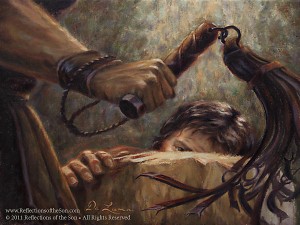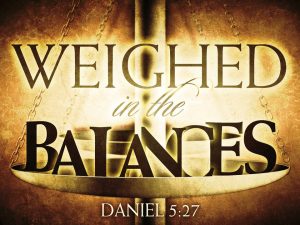25. Shalom and Grace

Surely our griefs He Himself bore, and our sorrows He carried; yet we ourselves esteemed Him stricken, smitten of God, and afflicted. But He was pierced through for our transgressions, He was crushed for our iniquities; the chastening for our well-being fell upon Him, and by His scourging we are healed. (Isaiah 53:4-5)
The chastening for our well-being fell upon Him. This is a significant change. In all four of the previous substitutions, every single one of them dealt with acts or attributes which were willingly committed by us, were inherent in our nature, and as such, the consequences were well deserved. And yet Christ interceded. But this substitution is not deserved, and Christ still pays for it.
We have moved from that which is intrinsic to us—grief, sorrow, transgressions and iniquity—to that which is not: well-being. But how often do we seek things which we do not deserve? And how often do we seek to avoid that which we rightly deserve?
What is translated as well-being is a familiar word: shalom. The vast majority of translations of this word is peace; it accounts for about seventy-five percent. But it is more than peace; and it is much more than the simple cessation of hostilities; indeed it is the removal of hostilities. Other meanings are: friends, prosperity, well-being and health.
The word chastening is really discipline, correction, or instruction. Within this chapter, here is the most benign consequence. But when discipline is heaped upon the other more serious judgments, was it felt as a bit of a reprieve, or just one more “punishment” piled on to an already overwhelming and devastating avalanche of pain, sorrow, and suffering.
Two intersecting paths are revealed in Hebrews showing us the discipline that was placed upon Christ: one was what He went through for Himself and us, the other becomes the example and encouragement for what we will go through, to help others.
Therefore, He had to be made like His brethren in all things, so that He might become a merciful and faithful high priest in things pertaining to God, to make propitiation for the sins of the people. For since He Himself was tempted in that which He has suffered, He is able to come to the aid of those who are tempted. (Heb 2:17-18)
Although He was a Son, He learned obedience from the things which He suffered. And having been made perfect, He became to all those who obey Him the source of eternal salvation, being designated by God as a high priest according to the order of Melchizedek. ( Heb 5:8-10)
“My son, do not regard lightly the discipline of the Lord, Nor faint when you are reproved by Him; For those whom the Lord loves He disciplines, And He scourges every son whom He receives.” It is for discipline that you endure; God deals with you as with sons; for what son is there whom his father does not discipline? All discipline for the moment seems not to be joyful, but sorrowful; yet to those who have been trained by it, afterwards it yields the peaceful fruit of righteousness. Therefore, strengthen the hands that are weak and the knees that are feeble, and make straight paths for your feet, so that the limb which is lame may not be put out of joint, but rather be healed. ( Heb 12:5-7, 10-12)

Note, the direct outcome of discipline is not to turn within yourself, but to turn towards others. It’s discipline that strengthens the hands that are weak, and strengthens the knees that are feeble. It’s discipline that makes paths straight, and allows the lame limb to be healed. As He did it for you, so do it for others.
This is the fifth substitution: for our peace, our well-being, He was chastised and disciplined.


 within the context of another verse from the Psalms: For troubles surround me— too many to count! My sins pile up so high I can’t see my way out. They outnumber the hairs on my head. I have lost all courage. (Psalm 40:12) Yeah. There are days like that, when my sins pile up so high around me I can’t see my way out.
within the context of another verse from the Psalms: For troubles surround me— too many to count! My sins pile up so high I can’t see my way out. They outnumber the hairs on my head. I have lost all courage. (Psalm 40:12) Yeah. There are days like that, when my sins pile up so high around me I can’t see my way out. Now he good news is that Paul does not leave us waiting. The answer comes immediately in verse 25: Thank God! The answer is in Jesus Christ our Lord. So you see how it is: In my mind I really want to obey God’s law, but because of my sinful nature I am a slave to sin. So now there is no condemnation for those who belong to Christ Jesus. And because you belong to him, the power of the life-giving Spirit has freed you from the power of sin that leads to death. (Romans 7:25-8:2)
Now he good news is that Paul does not leave us waiting. The answer comes immediately in verse 25: Thank God! The answer is in Jesus Christ our Lord. So you see how it is: In my mind I really want to obey God’s law, but because of my sinful nature I am a slave to sin. So now there is no condemnation for those who belong to Christ Jesus. And because you belong to him, the power of the life-giving Spirit has freed you from the power of sin that leads to death. (Romans 7:25-8:2)